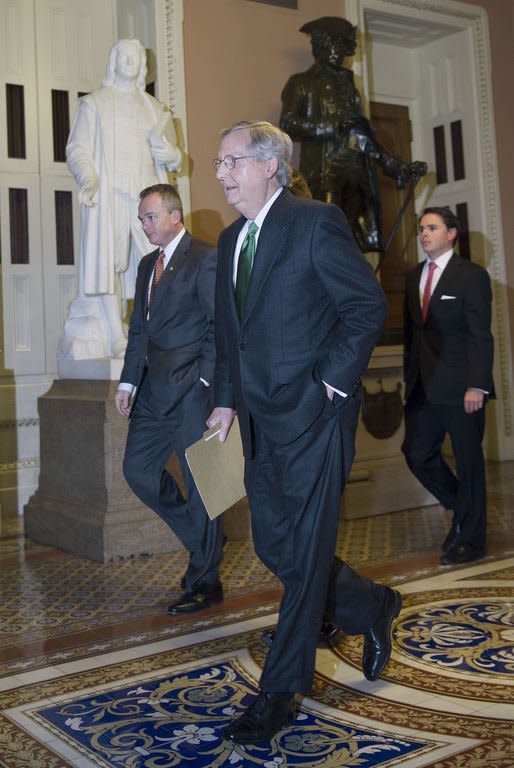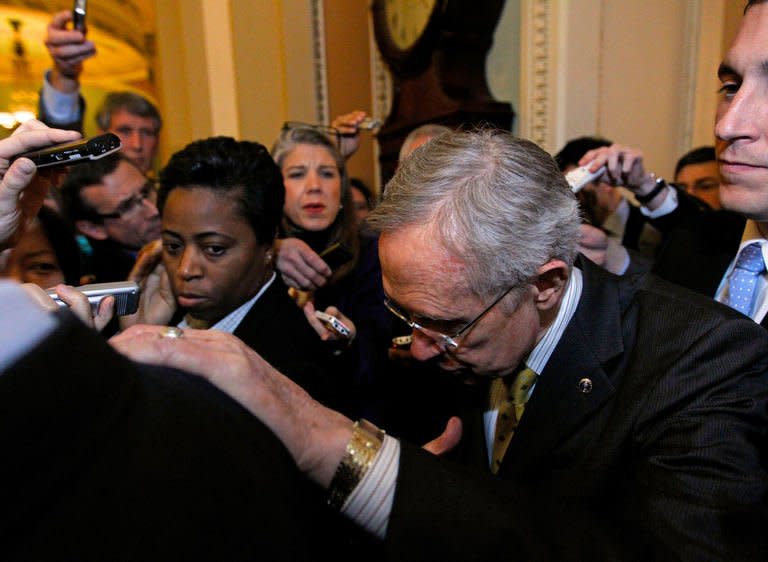Despite emerging deal, US to miss fiscal cliff deadline
US lawmakers missed a deadline to avoid the "fiscal cliff" budget crunch but inched towards a deal to ease the worst impact of the crisis by heading off economy-busting tax hikes. In dramatic New Year's Eve brinkmanship, Republicans and the White House reached an agreement that means only the richest Americans will pay more tax, but were still deadlocked on how to avert $109 billion in automatic government spending cuts. Despite the emerging deal, the economy will technically go over the cliff at midnight after aides to Republican leaders in the House of Representatives said no vote on a pact could be scheduled in time on Monday. Senators meanwhile were still hoping for a late-night vote if a deal is finalized. The legislation would then go to a House vote on Tuesday. While automatic spending cuts and tax hikes will come into force on January 1, global stock markets will be closed on New Year's Day, giving lawmakers a few more hours of breathing room before panic over the US economy sets in. "If a deal is reached, there's little difference between a vote tonight or tomorrow to give members a chance to review," a House Republican source said. President Barack Obama earlier said a deal was close though not done and the top Senate Republican negotiator Mitch McConnell, who thrashed out a compromise with Vice President Joe Biden, agreed. "It appears that an agreement to prevent this New Year's tax hike is within sight. It's not done. There are still issues left to resolve, but we're hopeful that Congress can get it done," Obama said at the White House. Sources said the deal would include a two-month postponement of the sequester, the sweeping package of automatic government spending cuts that is feared, especially by the Pentagon. It would also mean a return to Bill Clinton-era tax rates for top earners to 39.6 percent, starting at a threshold of annual household earnings of $450,000 and above. Obama had originally campaigned for tax hikes to kick in for those making $250,000 and above and his acceptance of a higher threshold has already angered liberals, though still represents a political victory. As he tried to sell the emerging deal to his Democratic Party's liberal base, he said it would extend tax credits for clean energy firms and also unemployment insurance for two million people due to expire later Monday. It was also expected to include an end to a temporary two percent cut to payroll taxes for Social Security retirement savings and Medicare health care programs for seniors and changes to inheritance and investment taxes. The president angered Republicans in remarks in which he warned -- in what is certain to be a bitter fight over cutting the deficit -- that he was not done with seeking higher taxes for the rich. "Now, if Republicans think that I will finish the job of deficit reduction through spending cuts alone... then they've another thing coming," Obama said, and also poked fun at the glacial pace of Congressional deliberations. Republicans immediately took to the floor of the Senate to complain. Senator John McCain accused Obama of ridiculing Republicans and of needlessly antagonizing House of Representatives' members who will be required to vote for an eventual deal. Republican Senator Bob Corker said his heart was pounding with disappointment at Obama's remarks. "I know the president has fun heckling Congress. I think he lost probably numbers of votes with what he did," he said. "It's unfortunate he doesn't spend as much time solving problems as he does with campaigns and pep rallies." Signs that a deal could be close cheered investors Friday as US markets rose before closing for the year. The Dow Jones Industrial Average closed up 166.03 points (1.28 percent) at 13,104.14. Even as a deal neared, both sides were gearing up for the next legislative showdown over the need to lift the government's statutory borrowing limit of $16.4 trillion, which was reached Monday. The Treasury will now take extraordinary measures to keep the government afloat for an undisclosed period of time until the ceiling is raised. Republicans are already demanding spending cuts in return. "I think there is going to be a pretty big showdown next time when we go to the debt limit," McCain told CNN.





